new posts in all blogs
Viewing: Blog Posts Tagged with: ethelmdell, Most Recent at Top [Help]
Results 1 - 5 of 5
How to use this Page
You are viewing the most recent posts tagged with the words: ethelmdell in the JacketFlap blog reader. What is a tag? Think of a tag as a keyword or category label. Tags can both help you find posts on JacketFlap.com as well as provide an easy way for you to "remember" and classify posts for later recall. Try adding a tag yourself by clicking "Add a tag" below a post's header. Scroll down through the list of Recent Posts in the left column and click on a post title that sounds interesting. You can view all posts from a specific blog by clicking the Blog name in the right column, or you can click a 'More Posts from this Blog' link in any individual post.
This is the weekend of my favorite book sale. It’s held by a small library upstate, very few books are over a dollar, and if you buy a $10 tote bag, you can take home as many books as will fit in it. And that, of course, is what I did.

It's hard to tell in the picture, but this is a really big tote bag.
I usually limit myself to as many books as I can carry in my hands, so when my arms started to hurt, I went to check out. But once I’d gotten by books into my bag, the woman at the counter said, “you know, there are more books in the other building.” That was my downfall.
Anyway, here are the things I got, in reverse order as I unpack.
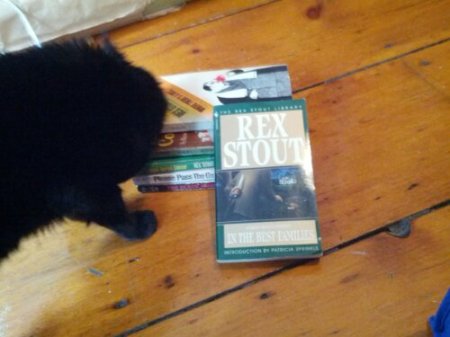
I didn’t by all the Nero Wolfe books–just the cuter, older paperbacks and In the Best Families because it’s In the Best Families. Apparently my cat likes Nero Wolfe too.
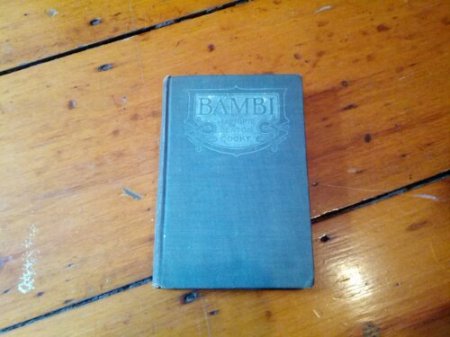
Not the Felix Salten one with the deer, but the Marjorie Benton Cooke one with the people. The woman who helped me check out said she heard it was pretty racy, which seems unlikely, but I told her I would be pleased if that turned out to be the case.
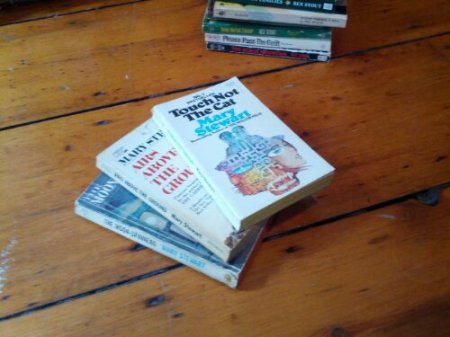
I keep meaning to try Mary Stewart. And at this point I had well over $10 worth of books, so these were basically free.
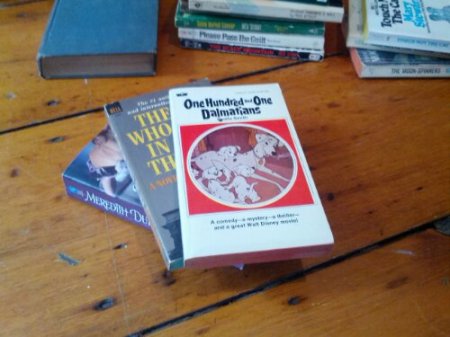
Some miscellaneous paperbacks–One Hundred and One Dalmatians because my copy is missing pages, The Spy Who Came in From the Cold because I can’t find my mom’s copy, and a romance by Meredith Duran for no reason at all.
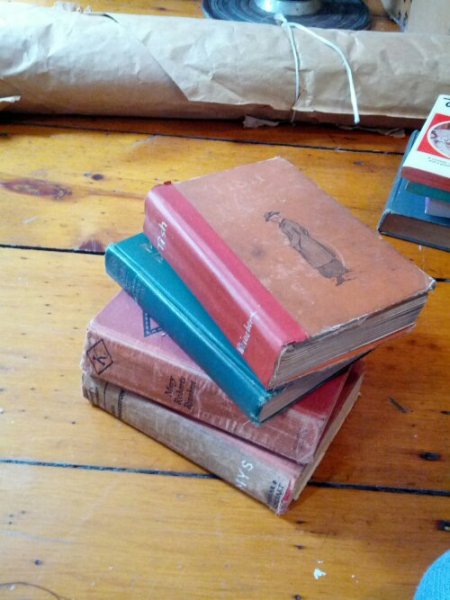
This is the Mary Roberts Rinehart portion of the haul. All of these books are more battered than all of the other books, but who cares? I own a copy of K
now.
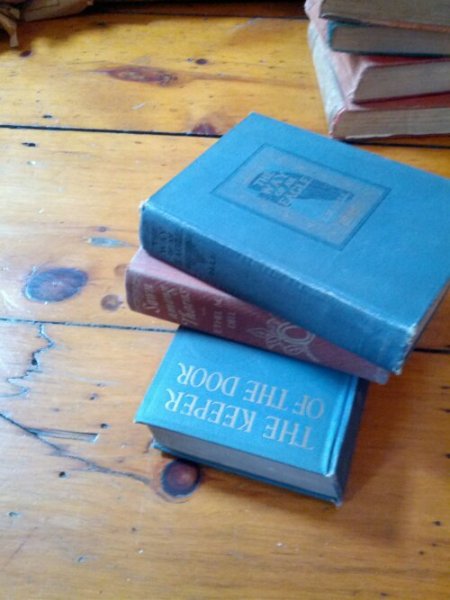
This is the Ethel M. Dell portion of the haul. I…own a copy of The Way of an Eagle now. So, uh, that’s a thing.

The last few miscellaneous things: Rose in Bloom, my favorite Alcott bok I’ve never owned; Trustee from the Toolroom, which I buy whenever I find it so I can give it as a gift; and Brat Farrar, which I own a couple of times over, because this copy is super cute. I assume the girl in the sheet on the cover is Eleanor, but I don’t understand why.
Tagged:
ethelmdell,
louisamayalcott,
maryrobertsrinehart,
rexstout,
stuff 

I don’t know why I’m still reading books by someone who names her heroes things like ‘Everard,’ but here’s another Ethel M. Dell for you: The Lamp in the Desert. She doesn’t let you forget that title; the lamp motif is everywhere.
The Lamp in the Desert is set in India, and shares one minor character with The Way of an Eagle. I like it when authors do that — just enough crossover between books to let you know that they’re all set in the same universe. Especially if, as with Dell, you have to posit an alternate universe where human behavior bears only a vague resemblance to reality to enjoy her books in the first place. Dell always verges on terrible, but she does it in a very distinctive way. Her romances are almost as convoluted as they are passionate, but she mostly manages to make them appealing, too. It’s just a bit terrifying to think that all of these ridiculous people are supposed to exist simultaneously.
The Lamp in the Desert is maybe even more convoluted than it is passionate. And the hero really is named Everard. He’s a captain in the army, and he’s all intense and reserved and hasn’t really got any friends, except for Tommy Denvers, who he once nursed through malaria. Tommy’s adoration of Everard verges on the homoerotic, which would be more fun if Everard wasn’t desperately in love with Tommy’s sister Stella. People in Dell’s books never just love each other; they’re always desperately in love. In these case, though, there’s a bit of a reason for the desperation: Stella is about to marry Ralph Dacre, who is, as Tommy says, a “rotter.” And while this sucks for Stella, I have little sympathy for Everard, who, instead of trying to win Stella for himself, deliberately avoided her and led her to believe he hated her.
Stella realizes after her marriage that it’s been a terrible mistake, and, while she’s seriously impressed by the scenery at the place where she and Ralph are honeymooning, instead of deriving enjoyment from it she decides that she’s been admitted to paradise under false pretences and is going to be kicked out. Meanwhile, back at the army base, Everard receives a letter from his brother Bernard, a prison chaplain, revealing that Ralph actually already has a wife living, which means that Stella isn’t legally Ralph’s wife. Everard decides he has to fix this situation, which is commendable, but the way in which he goes about it seems calculated to cause the most possible complications later.
First, he lies to his commanding officer about needing to go to England to see his brother. Then, disguised as a beggar, he travels to the place where Stella and Ralph are staying. He acts super creepy and freaks Stella out, and then he asks to speak to Ralph privately, convinces him to clear out, and returns to tell Stella and Ralph’s Indian servant Peter that Ralph has fallen of a cliff. It would be surprising if she didn’t conclude that he’d murdered her husband. And I guess it’s nice that he’s trying to protect her from the knowledge that she wasn’t really married as well as the disgrace, but everyone would have been so much happier if he’d just been honest with her.
As soon as Stella gets back to the regiment (feeling somewhat cursed) Everard starts courting her by alternately insisting that he’s going to give her space and acting really pushy. At one point he attempts to sexually assault her while he’s coming down with malaria and also, as we learn later, high. And so he badgers her into being as desperately in love wi
Time for entry three in the ongoing saga of “Do I or do I not like Ethel M. Dell? How long do I have to decide?” The short version: I think I need more time.
Charles Rex isn’t ever going to be my favorite anything — not even my favorite book where a wealthy aristocrat with a bad reputation takes a waifish young boy under his wing only to discover that the boy is a girl and fall in love with her — but it’s not terrible, and “not terrible” is, to be honest, all I’m looking for from Dell. I never expected her to rise to the level of The Way of an Eagle again, although I kind of expected her to try in this one, after what seemed in The Obstacle Race to be a half-hearted attempt to duplicate Nick Ratcliffe. Sadly, Lord Saltash is neither as monkeyish nor as appealing as Nick, although, to be fair, he’s not as crazy either. But then, nor is the heroine occasionally repelled by him, as Muriel was by Nick. Toby, AKA Antoinette, Mignonette, Nonette, Toinette, etc., worships Saltash from the moment he rescues her from a hostile Italian hotel proprietor.
Toby’s hotel-boy disguise fails her when Saltash’s yacht the Night Moth gets hit by a larger ship and she, Saltash, and the Night Moth’s Captain Larpent are the only survivors. Saltash passes Toby off as Larpent’s daughter to save her reputation, and, as Larpent is badly injured and unconscious, there’s not much he can say about it.
While Larpent is recovering, Saltash brings Toby to stay with what I assume must be the hero and heroine of Dell’s novel The Hundredth Chance, Jake and Maud Bolton. Maud had once been engaged to Saltash and still has a soft spot for him, and I have the impression that Jake is meant to be American, although it’s hard to say: on one hand, he uses the word ‘reckon’ a lot, but on the other hand, it sometimes shares sentence space with ‘shan’t’.
Anyway, Toby settles down with the Boltons and their four small children and tries not to swear as often as she normally does. She also makes friends with Maud’s younger brother, Bunny, and they basically hang around betting on horse races together until he realizes that she’s pretty, sexually assaults her, and badgers her into getting engaged to him. Weirdly, this is supposed to indicate that he’s young and innocent, and not just an asshole, although that fiction wears thin when he finds out that Toby used to work as a hotel boy and promptly repudiates her. The fact that he thinks dressing as a boy is synonymous with being sexually promiscuous is, I think, also meant to indicate his innocence, and — to give credit where credit is due — it is slightly more convincing than the sexual assault.
At this point, Toby goes and tells Saltash that she found Bunny kind of unconvincing too, and that what she’d really like is to be Saltash’s mistress. This is apparently what it takes to convince him of her love, and since he’s been silently pining for her almost as long as she’s been silently pining for him, he’s like, “Okay, cool. Let’s get married.” And they do. Only, for some mysterious reason, he neglects to inform her that he’s in love with her. I guess Dell didn’t think the book was long enough yet. Also, she had a really funny bit she hadn’t yet had a chance to use, and she didn’t want to let the whole Toby-masquerades-as-Larpent’s-daughter/Larpent-has-a-mysterious-romantic-past setup go to waste. Yes, it tur
After I finished reading Ethel M. Dell’s The Obstacle Race, I spent a while trying to figure out why I liked The Way of an Eagle so much. Some of it was obviously that I’d come up with an alternative reading that made things I normally find problematic a little less so. But I think amost of it was that it’s actually kind of a well put together book. I mean, Ethel M. Dell wasn’t a great writer or anything, but The Way of an Eagle really works. The subplots shed light on the central conflict between the hero and heroine. Separations between different sets of characters move their storylines forward. Everything moves toward the one climactic scene, and after that we get a brief epilogue to show that things are still going well, and then we’re done. Nothing is superfluous — I mean, except for all the flowery language. Once I realized that, I knew why I couldn’t quite like The Obstacle Race. It’s not the overuse of the word ‘mastery’, or the way that the heroine falls in love with the hero at least partially because he gets kind of scary when he’s mad, or the way Dell kills off the disabled kid brother, although those things were really not good, and sort of disturbing. It’s the way the plot is all over the place, and the characters are inconsistent, and the book drags on and seems like it doesn’t know what it’s driving at — although it’s hard to blame the book for that; I certainly didn’t know, and I suspect Dell didn’t either.
Presumably this is what happens when you’ve written a string of successful book and everyone talks about how passionate and romantic they are. You think up a bunch of random characters, each with a few conflict-creating skeletons in their closets, and let them be all passionate at each other until you run out of skeletons. And I’m sure that worked for Dell, financially. It’s just that there’s something to be said for, you know, figuring out in advance what’s going to happen.
In this case, Dell has plopped us down in an English seaside village. The local big shot is Mr. Fielding. He was in love with a woman of lower social standing, but now she’s dead and he’s married to Vera. No one likes Vera very much, but that’s okay, because she doesn’t like them either. Dick Green, the local schoolmaster, is the son of Fielding and his dead lover, but only he and Fielding know that. He has two younger half-brothers, twins. Jack is an asshole. Robin is developmentally disabled and/or brain-damaged, and it’s probably, but nonspecifically, Jack’s fault. Also, Dick is has been anonymously publishing satirical novels, which — well, I can see how that adds some symmetry to the plot, but a) more symmetry really isn’t what’s needed here, and b) at no point does this make sense.
Juliet Moore has come to board with the local blacksmith’s family in order to get away from the frivolity of London, where she acts as a companion to Lady Joanna Farringmore, except that obviously that’s nonsense and Juliet is Joanna Farringmore, as you will soon realize if you have, at any point in your life, read a book. The rest is pretty easy to figure out, too: Juliet and Dick fall in love, although not until Juliet has seen Dick look at Jack as if he’d like to murder him, the power balance between them shifts uncomfortably into Dick’s favor, and Dell tries to convince us that there are many obstacles to their union.
Chief among the obstacles is Robin. Or maybe not. It kind of depends on who you ask. Juliet says that’s she’s very fond of Robin, and that he wouldn’
I’d been putting off reading Ethel M. Dell’s The Way of an Eagle since early 2006. Partly because it sounded kind of dull, I guess. Partly because I was worried that it would be full of rape fantasies like E.M. Hull’s The Sheik. And, sure, it’s not feminist literature or anything, but I found it charming, in a disturbing kind of way, and I’m sorry I put it off for so long. Yes, there’s a helpless, slightly dithery young woman, but she’s only helpless and dithery in fairly trying situations. Other times, she likes to play hockey. And yes, the hero is powerful and commanding and all that, but he also looks like a monkey and is slightly insane (Dell repeatedly describes him as looking like a monkey. The insanity I figured out on my own.) Also, the heroine is scared of the hero, which is not as sexy as many romance writers seem to think. But when you factor in Nick Ratcliffe’s slight case of insanity, it seems perfectly reasonable. Apparently there’s a new trend in treating Alzheimer’s where the doctors just let the patients do whatever weird thing they want to do, and that calms them down. This book is a little bit like that.
We’re first introduced to Muriel Roscoe and Lieutenant Nick Ratcliffe at a fort somewhere in India. She’s the daughter of the Brigadier-General commanding the fort, and he’s one of the other three white officers present. They’re under siege, they’re not going to be able to hold out much longer, and Muriel’s father is worried. Not so much about dying — he’s pretty much fine with that. Really what’s bothering him is the conviction that once the rebels invade the fort, Muriel will be raped. So he asks that one of his officers volunteer to protect her. All of them are willing to die for her, so that’s not an issue, but only Nick Ratcliffe is willing to kill her if necessary, so the Brigadier chooses him. This is, to say the least, a little bit crazy. But in the alternate universe in which Dell’s novel takes place, it means he loves her.
Muriel, meanwhile, has been locked into a room in the middle of the fort. This does keep her safe, but it also means that the only indication she has of what’s going on outside are the screams and the shooting, so mentally she’s not in great shape, and by the time her father entrusts her to Nick Ratcliffe, she’s gotten a bit addicted to opium. This actually has no bearing on the rest of the story — except, I suppose, in that it gives her a good excuse for being a nervous wreck — but it’s sort of entertaining.
Muriel is not particularly happy to entrusted to Nick — I mean, she’s not stupid, and Captain Blake Grange is a lot nicer, especially since it’s not yet evident that he’s a bit of a wimp — so Nick drugs her and carries her out of the fort on his back while Muriel’s father is on his deathbed. So: he looks like a monkey, he has a creepy grin, he’s kept Muriel from her dying father, he’s drugged and kidnapped her, and he’s sworn that he’s capable of killing her. And that’s all before he scares her half to death by murdering someone in front of her. Of course, the guy he murders was trying to kill (or rape) Muriel, but still. It’s hard to blame her for not liking him very much.
They’re only out there for a couple of days before they find a bigger chunk of the British Army to fall in with, and then they go to Simla to recover. Muriel is placed in the care of Lady Bassett, the extremely irritating wife of her guardian, while Nick, who has almost starved to death, stays in the hospital for a few weeks before resuming his usual activity of running around cackling to himself. I know I said he was just slightly insane











K!
This is why I avoid used-book stores and sales…I wouldn’t be able to resist overloading! But I am going to scout out a couple of used-book stores one of these days to look for a couple books by my favorite obscure authors. I just won’t let myself buy anything that isn’t on my list. Seriously. I mean it…
I’ve only read two Mary Stewart books so far (Nine Coaches Waiting and The Moonspinners), but I adored both of them and am eager to read more.
What fun! Would love to curl up on a rainy night with
any of those.
What fun! I do envy you having all those Mary Stewart books ahead of you. And Brat Farrar is one of my all-time favourite books. Have you read Josephine Tey’s other books? They’re wonderful too!
I can’t resist a used book sale either.
I don’t recall “Bambi” being particularly racy. It’s also, alas, not as good as “Cinderella Jane”.
I know!
I feel like I get away with it because this is the primary way I buy books — I rarely buy new stuff. If you’re looking for specific stuff, though, used book stores and book sales aren’t really the way to go — the magic of them is that you never find the specific thing you want, but you often find things you would not even have dared to hope for. For specific things, ABE books is probably better.
I’ve started The Moonspinners and I’m really enjoying it. Apparently it was made into a Disney movie with Hayley Mills, too, so I’m going to see if I can track that down.
Yeah, a rainy night — or even a reading vacation — is called for, but it’s going to have to wait until the Stanley Cup playoffs are over, probably.
I’m reading The Moonspinners now, and can easily imagine tearing my way through all her books in the near future. Are the Arthurian ones worthwhile, too, or just the modern ones?
I’m a huge fan of Josephine Tey, with the caveat that her racial/biological determinism makes me super uncomfortable. And Brat Farrar is probably my favorite, followed by The Franchise Affair.
You know, Marjorie Benton Cooke sounded really familiar to me, but I didn’t remember that it was because she wrote Cinderella Jane. I don’t know if I’m looking forward to it more or less now. And yeah, I’m pretty sure she was mistaking it for another book.